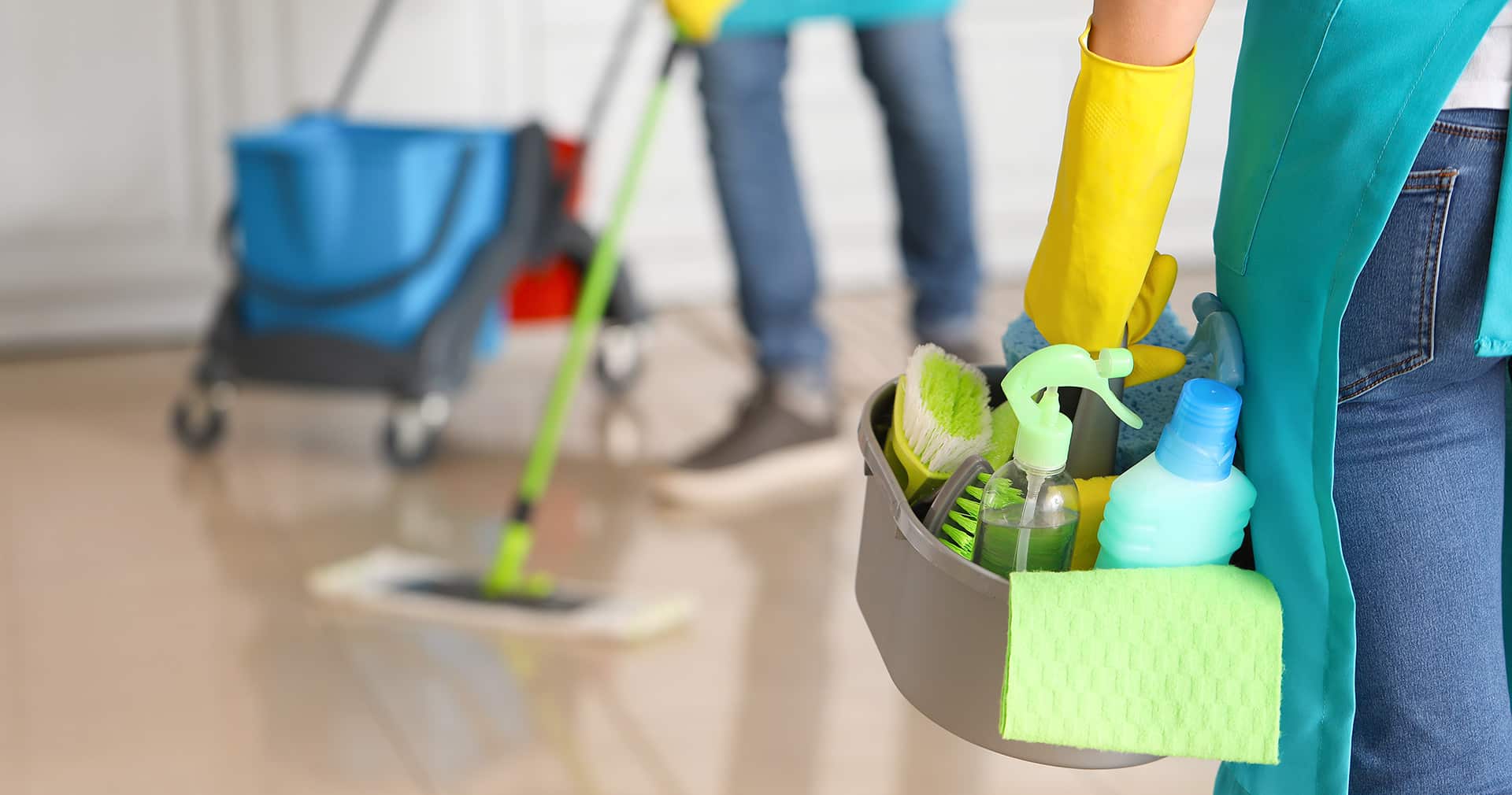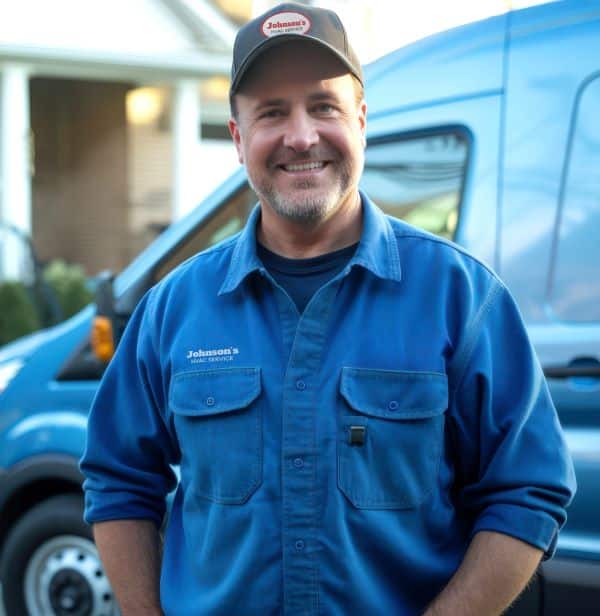Commercial Cleaning Services vs. Residential Cleaning Services
Now is the perfect time to either enter the cleaning market or rethink what you offer. This article will explore key differences between commercial and residential cleaning.

Staff Contributor
In 2021, almost three million people worked in the cleaning services industry in the US. The industry is growing. The global cleaning services industry is forecasted to reach $92.69 billion by 2027.
Now is the perfect time to either enter the cleaning market or rethink what you offer.
This article will explore key differences between commercial and residential cleaning. We’ll start with definitions of each. Then we’ll explore the most common types of tasks and services offered. Next, we’ll discuss differences in time, cost, and marketing. Finally, we’ll answer the critical question: Which focus area is more profitable?
What’s the Difference Between Commercial and Residential Cleaning?
The key difference between commercial and residential cleaning is what you’re cleaning. Commercial cleaning companies clean commercial spaces—offices, medical facilities, and retail outlets. In contrast, residential cleaners clean domestic settings such as private homes.
Let’s explore the differences in more detail.
What is a commercial cleaning business?
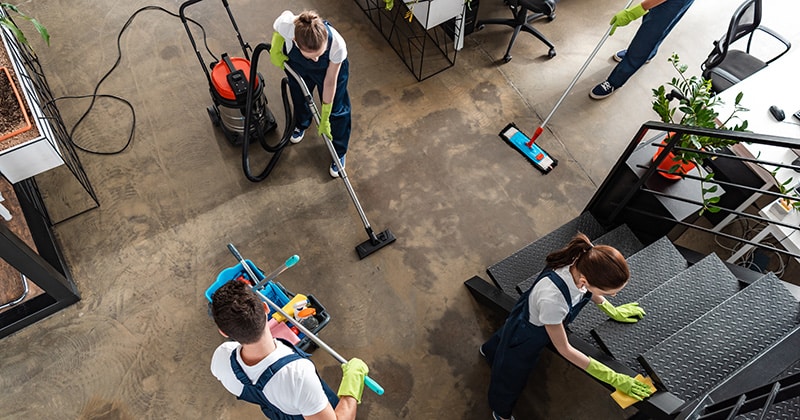
A commercial cleaning business cleans a room, area, or building. Owners or managers of commercial premises hire them, often to work on an ongoing basis.
Commercial cleaners generally work in teams. They use special equipment to clean and sanitize different types of commercial premises:
- Medical facilities, such as doctor’s offices and hospitals
- Commercial kitchens
- Schools and college campuses
- Office buildings
- Industrial facilities, such as factory floors and warehouses
Such spaces are often subject to stringent health and hygiene standards. These standards have only become stricter since the pandemic’s onset.
Commercial cleaning teams leverage technology and specialized techniques to achieve optimal hygiene. They must do so to meet workplace health and safety requirements. For example, an electrostatic spray disinfection tool ensures a comprehensive clean. Specialized techniques like this may require advanced knowledge and training.
Commercial cleaning companies are almost always insured or bonded. This protects individual cleaners from legal liability if cleaning results in property damage.
Commercial cleaning companies might serve all commercial clients or focus on a niche. For example, one business might focus on hospital and healthcare cleaning. Another might exclusively clean office buildings. Some might use environmentally friendly and low or non-toxic products. Others might specialize in carpet cleaning or move-out cleaning.
What is a residential cleaning business?
A residential cleaning business cleans houses, apartments, and other living spaces. Residential cleaners might work alone or in small teams. They might work for a larger company or be self-employed.
Residential cleaning businesses vary significantly. Some are large, while others are one-person operations. Some offer many types of services or even do it all. Others specialize—perhaps using green alternatives to harsh chemical cleaners.
There is no standard around residential cleaning businesses being insured or bonded. Thus, cleaners may be liable for any damage to the property resulting from the cleaning service.
Commercial Cleaning vs. Residential: Services and Jobs
How do commercial cleaning services differ from residential cleaning services? What are the day-to-day tasks that each type of cleaner will likely do? Before you decide which kind of business is best for you, consider the realities of each position. Does one stand out as more appealing?
Commercial cleaning services
Commercial cleaners typically work with clients on an ongoing basis. What the work looks like depends on the size, scale, and type of customer. The tasks of a commercial cleaning team are going to vary by contract as well as customer.
The daily work of a commercial cleaner may include tasks like these:
- Clean near and around electronic equipment with care.
- Clean elevators.
- Clean glass doors.
- Clean mirrors.
- Dust surfaces, including tables, desks, chairs, stands, and other furniture and fixtures.
- Empty waste bins and replace bin liners.
- Mop hard floors and, if required, use cleaning tools and disinfectant.
- Sanitize equipment, fixtures, furniture, and floors as needed.
- Sweep and mop stairs.
- Vacuum floors, carpets, rugs, and mats.
Weekly (or monthly) services may include tasks like these:
- Clean the server room.
- Clean windows inside and out.
- Deep clean and buff all hard floors.
- Deep clean carpets.
Residential cleaning services
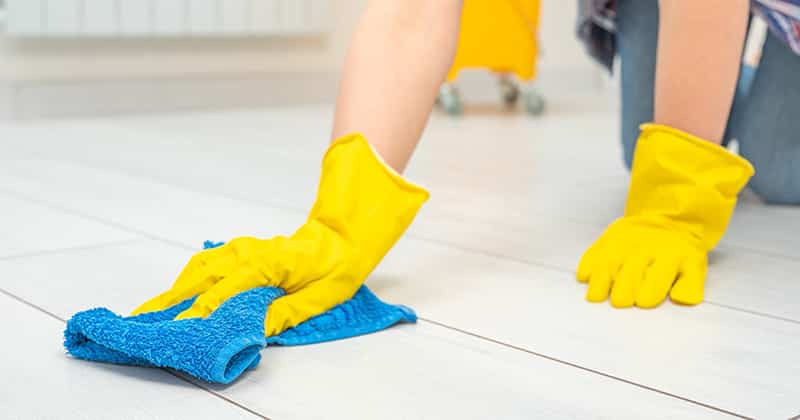
Residential cleaners operate according to each customer’s needs. One customer might have a weekly general cleaning service. Another might need a twice-yearly deep clean. Some might want only their kitchen and bathroom cleaned. Others just want their windows and floors done.
Here are some of the most common residential cleaning tasks:
- Clean and disinfect toilets.
- Clean light fixtures.
- Clean the bathroom sink, shower, and bathtub.
- Clean the kitchen cabinets, countertops, stove, and oven.
- Dust shelves and windowsills.
- Empty waste bins and replace bin liners.
- Tidy up by making beds and putting away toys, books, clothes, and so forth.
- Sweep, vacuum, and mop hard floors.
- Vacuum and steam clean carpets.
Commercial Cleaning vs. Residential: Cost, Time, and Marketing
Commercial and residential cleaning differ in many ways. To discover which specialty suits you best, think about the details. Cost, time, and marketing requirements are critical considerations. Let’s explore the differences between the two so you can make an informed decision. The right choice for you will reap long-term rewards.
Cost
Running a commercial cleaning business costs more than its residential counterpart for several reasons.
Equipment
Commercial cleaning is done on a larger scale than residential cleaning. Thus, commercial cleaning businesses need more supplies, more tools, and higher-tech equipment.
Commercial cleaners usually use commercial-grade or industrial equipment. Those items can’t be found in a big box store. The heavy-duty tools equip commercial cleaners to clean to standards faster.
Employees
One person can run a successful residential cleaning operation. They’ll wear a lot of hats if they do. Handling admin tasks? Launching local marketing campaigns? Liaising with clients? Restocking supplies? Doing all the cleaning themselves? They can cover it.
One person would be hard-pressed to clean an entire hotel or office building alone. Commercial cleaning companies need teams. Paying team members a fair wage for their work is vital, and that adds up. The average base rate for a commercial cleaner is $13.75 per hour.
Price Per Clean
Commercial cleaning requires a higher upfront capital investment. But, if you go the commercial route, you can charge more for your services.
Consistency
Commercial cleaning businesses often provide their services in contracted package deals. They might clean floors two and three of an office building twice per week on a six-month contract. With arrangements like this, you’ll get reliable income plus a higher price per clean.
- Residential cleaners experience ebbs and flows in revenue. Seasonality is often involved. During the holidays, they might see double their average income. During the off-season, they might bring in just half of that average. Running a successful residential Several factors influence the time difference between commercial and residential cleaning:
- Size of the property. Commercial cleaners typically clean larger properties than residential cleaners. The larger the property, the more time it takes to clean.
- The number of employees. Commercial cleaners usually work in teams. Residential cleaners work in teams, too, but they are just as likely to clean solo. As the saying goes, many hands make light work.
- Cleaning standards. All dedicated cleaning businesses strive to deliver exceptional results. But commercial cleaners may need to meet specific, sometimes even regulated, cleaning standards. Cleaning to this standard may take longer. Some commercial cleaning businesses serve healthcare facilities. The Centers for Disease Control and Prevention (CDC) sets standards here. View their best practices for cleaning healthcare facilities.
Marketing
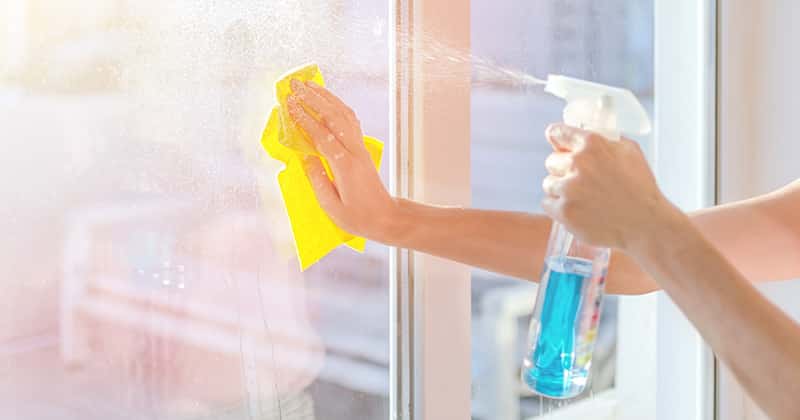
Successful marketing strategies are audience-focused. They are tailored to appeal to the unique wants, needs, and challenges of a defined group. Commercial and residential cleaners serve very different clients. Therefore, their marketing approach will differ significantly, too.
Marketing for Commercial Cleaning
Consider a commercial cleaning company’s ideal client—a business or organization with employees who operate brick-and-mortar premises. The company will likely benefit from business-to-business (B2B) marketing tactics. Here are some examples:
- A combination of search engine optimization (SEO) and content marketing to drive more organic traffic through value-added content that showcases industry expertise and thought leadership
- Email marketing that focuses on building long-term relationships with prospects and customers
- Social media tailored for B2B relationships, such as LinkedIn—93% of B2B marketers used LinkedIn to distribute content in the past 12 months, and 77% said it produced the best results of all social media platforms
Marketing for Residential Cleaning
A residential cleaning company has a distinctly different target audience—people with enough disposable income to invest in regular cleaning services or people who require a one-off specialty clean, such as before the holidays or when moving out of their homes. Therefore, the company will likely benefit from business-to-consumer (B2C) marketing approaches, including these:
- Personalizing content across their website, social media, and email by segmenting audiences and crafting articles and posts that answer common questions
- Encouraging happy customers to write reviews on Facebook or Google Business—93% of users say online reviews impact their buying decisions
- Actively using the social platforms your audience prefers, such as Facebook and Instagram
Commercial Cleaning vs. Residential: Which Is More Profitable?
Is a commercial or residential cleaning business more profitable? In most cases, commercial cleaning services are more profitable than residential cleaning services. But which cleaning business will be best for you? That answer is more complicated. Here are some things to consider:
- Your budget. Commercial cleaning businesses cost significantly more to start than residential cleaning businesses.
- Your location. Do you have access to potential commercial cleaning clients? Do you live in an area where people have money to spend on residential cleaning services?
- The competition. Check out potential competitors near you. Is there room in the market for another player? Can you differentiate your business with a unique value proposition?
- Employees. If you opt for a commercial focus, do you have access to skilled and reliable employees? Can you pay them fairly?
- Experience. An excellent place to start is in residential cleaning. If you’re new to running a business or the cleaning industry, you might find it easier to start there. You’ll learn and build a positive reputation in your community. Then, you can move into commercial services.
The Cleaning Industry Is Ready for You
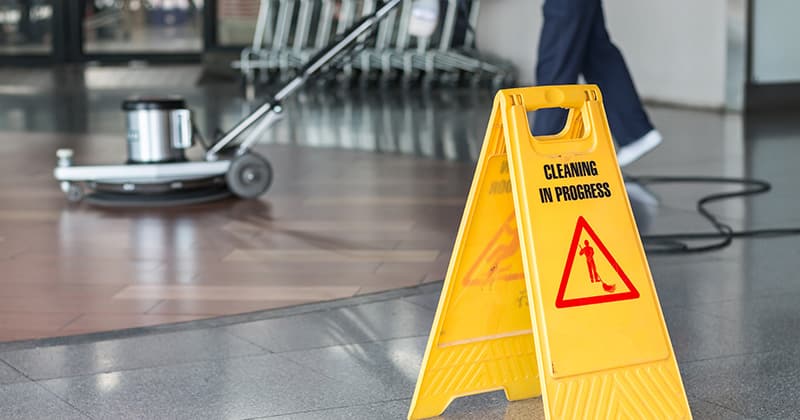
Now is the ideal time to start a cleaning business, whichever way you decide to go.
Melissa Hockstad is the CEO of the American Cleaning Institute. She says the commercial cleaning industry is experiencing a “once-in-a-century type of market.”
The residential cleaning industry is also thriving. Recent analysis suggests a correlation between demand for it and disposable income. When incomes are up, households are better positioned to outsource chores.
All cleaning businesses are primed for success. You decide to focus on commercial or residential cleaning services. You can become the leading cleaning services provider in your community.
Take the Next Step
To figure out where you best fit, start by answering these questions for yourself:
- What kind of cleaning work is most appealing to you?
- Would you rather go it alone or work with a team?
- If you’re interested in hiring a team, how would you want to structure your business? What would you pay employees, and what would it take to make that happen?
- How much money do you have to spend starting your business?
- Who would you target for cleaning services? How? Do you have any connections in the commercial sector?
Answering these questions will point you in a direction. Then you can get started on the fun stuff like naming your business.
Lauren makes things happen. When she’s not orchestrating processes or pitching in on content creation, she’s typically reading, snuggling her dog, working on her current favorite handwork, and/or chilling with her husband.

Business Solutions For Field Service Pros
EverPro offers specialized solutions designed for home and field service professionals. We’ve got the business tools to help you get the job done.
